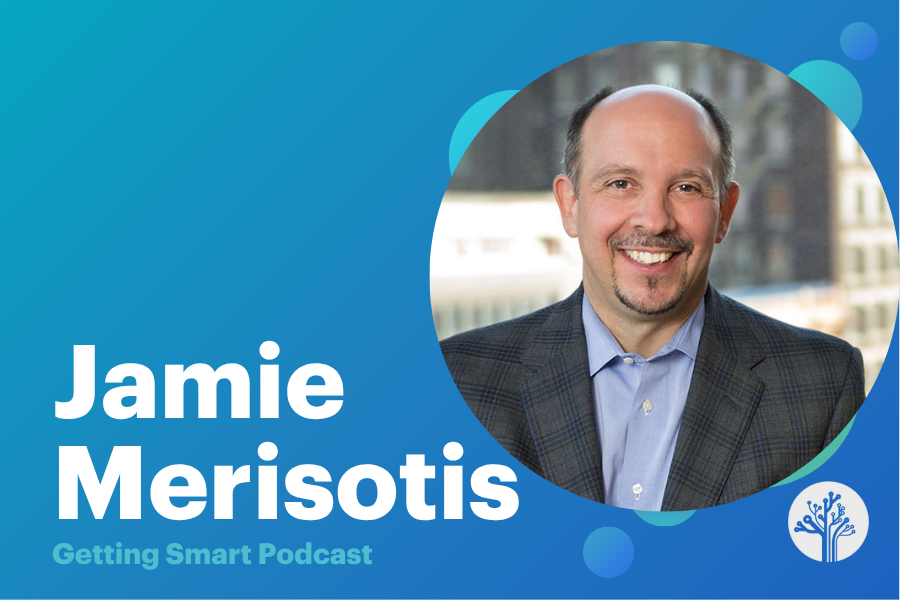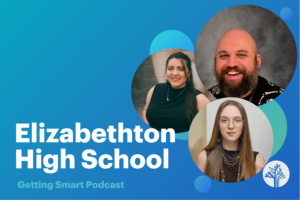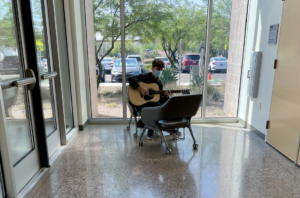Jamie Merisotis on Human Work in the Age of AI
Key Points
-
It’s crucial to clearly define the human skills that are uniquely valuable, such as creativity, critical thinking, and empathy, and to understand how AI can complement these skills.
-
The Lumina Foundation aims to increase the percentage of the U.S. workforce with meaningful degrees or credentials to 75% by 2040, emphasizing the need for education systems to adapt to the changing job market.

In this episode of the Getting Smart Podcast, Tom Vander Ark engages in a thought-provoking discussion with Jamie Merisotis, CEO of the Lumina Foundation, about the evolving landscape of work and education in the age of artificial intelligence. As industries rapidly adopt AI technologies, Jamie shares insights on how human work is transforming and the crucial role of credentialing in ensuring economic prosperity. The conversation highlights the importance of redefining educational goals to include not only degrees but also valuable credentials that align with the demands of the modern workforce. Tune in to explore how AI is reshaping professions, why empathy and human skills remain essential, and how Lumina Foundation’s ambitious goal aims to have 75% of the U.S. workforce equipped with meaningful credentials by 2040. This episode is a must-listen for educators, policymakers, and anyone interested in the future of work and education.
Outline
- (00:00) Introduction and Key Questions
- (02:29) AI’s Rapid Adoption and Implications
- (07:38) Future of Work and Job Displacement
- (10:58) Entrepreneurship in the Age of AI
- (13:19) Higher Education’s Role in the AI Era
- (18:22) Redesigning Higher Education
- (23:14) Lumina Foundation’s Future Goals
- (26:38) Conclusion and Acknowledgements
This transcript may have been edited and made more concise for clarity.
Introduction and Key Questions
Tom Vander Ark: Two big questions today: What is human work in the age of smart machines, and given the evolving nature of work, what are the implications for post-secondary education? I’m Tom Vander Ark. You’re listening to the Getting Smart Podcast, and today we’re joined by three-time guest Jamie Merisotis, the 17-year president of the Lumina Foundation in Indianapolis. Jamie, it’s great to see you.
Jamie Merisotis: Great to see you, Tom, and hopefully third time’s the charm.
Tom Vander Ark: We connect every couple of years, in part because you’re the dean of higher education funders. I think you’re the most important voice in terms of the direction of post-secondary education in America. You’ve also become a real student of the implications of artificial intelligence on the nature of work over the last five years. You wrote a terrific book in 2020 called “Human Work in the Age of Smart Machines,” where you articulated a fresh take on the nature of work and where it was headed. It strikes me that since then, we’ve gone through what I like to think of as the second inning of the age of AI. Just in the last few months, with the introduction of reasoning engines, we now all have access to a remarkable level of expertise. We’ve started to see some tech layoffs and a softening in technical employment. What’s your take in 2025 on how work is changing?
Jamie Merisotis: If you go back to when I wrote the book, it was just as COVID-19 was hitting. That’s pre-ChatGPT, which now interestingly seems like a long time ago. During that time, we could see in greater focus what was coming with what we now call large language models. These tools have changed the public’s consciousness of what artificial intelligence is.
AI’s Rapid Adoption and Implications
Jamie Merisotis: Now, three years past the introduction of ChatGPT and all the developments that followed, we understand that some of the things I predicted were right. Human work is fundamentally being transformed by technology. We need to do a better job of being clearer about what humans are uniquely qualified to do and understanding how technology can complement human creativity, critical thinking, problem-solving, ethics, compassion, and all those unique characteristics. Over time, we’re starting to see many of these things unfold before us. One thing I didn’t fully anticipate in 2020 was how quickly adoption would take place, particularly in certain industries, and how AI would become a player in almost everything we do—politics, work, learning, etc. It’s coming into greater clarity now.
When you try to write a book predicting where the puck is going, sometimes you get it right. More importantly, the fundamental question of what humans will do in an increasingly technology-mediated world remains. That’s the question we must answer with greater clarity when it comes to education and training, and more broadly, our understanding of our human role in society.
Tom Vander Ark: Since your book, it feels like every profession has become computational. We discussed this with a group of computer science teachers in California yesterday. They’re facing an interesting dichotomy: some people say we won’t have to code anymore because AI does it for us, while every profession has become computational. I think we still need to study computer science, but it’s also clear that we need to incorporate data science into every profession. I want to talk about empathy. You wrote about empathy and compassion as truly human skills in your book. Recently, we’ve seen evidence that large language models are developing what appears to be a real sense of empathy. A recent study showed that some people prefer receiving feedback from a large language model more than a therapist. What’s your take on those developments?
Jamie Merisotis: I think we’re seeing advances in reasoning and other areas where large language models seem to mimic human empathy in ways that feel legitimate to humans. The question is whether that’s what humans want in terms of empathy over time. I’m still not sure that technology will have the same human capabilities we desire, especially regarding human interaction. I don’t know many people who believe their technology-mediated interactions are superior to their human interactions. However, as a complement to human traits like empathy and compassion, it’s interesting. It becomes another complement to human behavior and interaction, which is exciting and has implications in various fields, particularly those where human interactions and motivation are important.
Future of Work and Job Displacement
Tom Vander Ark: Jamie, your strategy work stretches all the way out to 2040. Have you thought about the future of work in the past year? Are we headed for much job displacement this year? Are you optimistic about AI creating new work, as our vice president seems to think, or are you pessimistic about the employment market? What’s going to happen?
Jamie Merisotis: I think I’m still where I was five years ago, which is a two-part argument. First, technology has always done two things: it has destroyed jobs and created new ones. Throughout history, whether it was the industrial age, the internet age, or now the age of AI, technology has eliminated certain human jobs and tasks. But it has also created new jobs and opportunities. Jobs will be created, and work will be created for humans to do. What may be different this time is that the speed and variability of how that will happen will be quite different. The asymmetrical nature of it and the ways technology will accelerate change in certain areas while stalling in others will be crucial to watch. The worry is that in certain industries, we will see rapid AI adoption and quick changes. In others, it may be slow. Two examples from industries I know well, higher education and philanthropy, illustrate this. In higher education, change is happening more rapidly now, while in philanthropy, it’s less so.
Tom Vander Ark: Right.
Jamie Merisotis: You want to get it done.
Entrepreneurship in the Age of AI
Tom Vander Ark: Some commentators think entrepreneurship is the job of the future. Technologists like Andrej Karpathy have said agency is now more important than intelligence. Do you buy the importance of entrepreneurship? Is the future about making a job as much as getting a job?
Jamie Merisotis: I think there’s truth to that. The cycle of job destruction and renewal will happen faster because of technology, making entrepreneurship more valued. The question is, what kind of entrepreneurship are we talking about? Social media influencers? Maybe not. But there are ways in which AI can be positive, increasing agency, human success, and well-being. I contend that the learning system, both formal and informal, is still the most important driver of human development. Continuing to learn as the world changes is increasingly important for our shared well-being and success. Lumina continues to focus on increasing credential attainment and credentials of value, leading to economic prosperity.
Higher Education’s Role in the AI Era
Tom Vander Ark: You recently updated your strategic vision. Your old goal of 60% degree attainment in higher education has increased to 75%, with a focus on degrees plus valuable credentials. Why is more higher education important given the rise of AI?
Jamie Merisotis: A little backstory: In 2008, when I came to Lumina, we saw the need for people with degrees and credentials to power the economy and strengthen democracy. We set a goal of 60% of Americans having a high-quality degree or other credential by 2025. We’ve gone from a 38% attainment rate in 2008 to 55% in 2023. We’ll get close to our 60% goal by 2025. It’s one of the greatest social change efforts in the last two decades. Lumina helped build the ecosystem, but it got people jobs, increased wages, and made them better citizens. Now, we’re in a different space. Doubts about job opportunities and AI’s impact on work are major concerns. Rising education costs are worrisome, and confidence in higher education is at an all-time low.
Tom Vander Ark: It almost mirrors the improvement in attainment from 35% to 55%, while confidence has switched from 55% down to 35%.
Jamie Merisotis: That’s right. After World War II, the GI Bill and other programs increased access to post-secondary learning. We haven’t solved access problems, but the net total is higher. Lumina and partners increased attainment, but now we face new challenges. The transformation of the workforce and higher education systems is needed to meet the demand for human talent and expand economic prosperity. That’s why our goal is 75% of the labor force having degrees or credentials of value leading to economic prosperity. We want to be clear about what a valuable credential is. Right now, wages are a measure, but it’s incomplete. We need to focus on other ways credentials are valuable and their role in prosperity.
Shorts Content
Redesigning Higher Education
Tom Vander Ark: How is higher education going to change to help meet this new goal? Are these credentialing programs going to sit outside formal education, or do you see higher education incorporating shorter credential sprints?
Jamie Merisotis: It’s going to be a combination. Some shorter-term credentialing certificates are already embedded in degree programs. More delivery of learning and credentialing will come outside the traditional system, but we need a way to judge the quality of all credentials. We need a system that translates what you know and what your credential means. That’s part of the redesign. Financing is another part—making higher education more affordable. The redesign of the business of higher ed is crucial. In the near term, AI will transform back-office functions in higher education. Teaching and learning will change in fits and starts based on advancements in technology, but the back office is ripe for transformation.
Tom Vander Ark: What about apprenticeships? Are they an important contributor to your goal?
Jamie Merisotis: Yes, they are important. Apprenticeships have been part of the American system, but there’s a cultural issue in the U.S. In places like Germany, Switzerland, and Singapore, apprenticeships are culturally different. We have more apprenticeships now, but not a lot more. We need to address the appetite for apprenticeships by employers and workers. They are part of the credentialing ecosystem.
Lumina Foundation’s Future Goals
Tom Vander Ark: I want to give you a chance to talk about the foundation’s work going forward. You’ve been an impact investor and supported entrepreneurs. Any changes we’ll see in your work as you aim for this new 75% goal?
Jamie Merisotis: Three things: building on what we’ve done, focusing on credentials of value, and redesigning the financing systems. We want to ensure every credential has value and that the system delivers on that value. We also need to rethink financing and improve access and completion rates. And we will continue to invest in private sector strategies that contribute to our goals. We’re reexamining our impact investing strategy with Casey Vander Strick. It’s part of our long-term plan to add new value in this space.
Conclusion and Acknowledgements
Tom Vander Ark: We’ve been talking to Jamie Merisotis, the CEO of the Lumina Foundation, about their new goal: by 2040, 75% of adults in the U.S. will have a degree or a valuable credential. Jamie, we appreciate your leadership. Anyone else you’d like to acknowledge?
Jamie Merisotis: Two shoutouts: first, to all the other post-secondary funders who have done incredible work alongside us. Second, to our partners who have helped deliver on this goal. Lumina doesn’t produce credentials, but our partners, including states and large national nonprofits, have been key to our success. We believe in using our resources and expertise to support these organizations.
Tom Vander Ark: People can find out more about your agenda at luminafoundation.org. Jamie, thanks for your leadership. Thanks to our producer, Mason Pasha, and the whole Getting Smart team for making this possible. Until next time, keep learning, keep leading, and keep innovating for higher ed degree attainment. See you next week.
Guest Bio
Jamie Merisotis
Jamie Merisotis, an internationally recognized leader in higher education, human work, philanthropy, and public policy, has been Lumina Foundation’s president and CEO since 2008.
Frequently sought as a media commentator and contributor, his writing has appeared in The Washington Post, The New York Times, The Wall Street Journal, Stanford Social Innovation Review, Washington Monthly, Politico, The Hill, Roll Call, and other publications. He is currently a regular Forbes contributor.
Previously, Merisotis was president of the nonpartisan, D.C.-based Institute for Higher Education Policy, which he co-founded. He was also the executive director of a bipartisan national commission, appointed by the president and congressional leaders, to study college affordability. Merisotis is the author of America Needs Talent, named a Booklist Top 10 Business book of 2016, and Human Work in the Age of Smart Machines, an Amazon bestseller released in 2020
Links
- Watch the full video here
- Jamie Merisotis LinkedIn
- Lumina Foundation
- New Lumina Vision
- Human Work in the Age of Smart Machines
- Diverse Teams Smart Tools Blog
- National Council for Workforce Education
Lumina Updates:









0 Comments
Leave a Comment
Your email address will not be published. All fields are required.